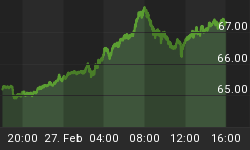The race to the bottom in the foreign exchange markets appears to be beginning in earnest. According to one analyst over 25 countries have intervened to devalue their currencies in the last 12 months - apparently a record of sorts in recent times.
A wag once said something to the effect that post gold standard "currencies don't float; they fall at different rates." Worse yet is the inflationary damage caused by the pursuit of the specious competitive advantage of a weak currency, particularly when others are attempting to engage in the same practice.
Everyone cannot have the weakest currency but everyone certainly can have high inflation as devaluations cause a loss of purchasing power of the currency in relation to assets whose quantities are not being inflated - e.g. hard assets such as gold, farmland, oil and other commodities. With the growing belief amongst the governments of the world in devaluation as part of the path to recovery consider what the CRB Spot Index may be indicating. The CRB has experienced a recovery to a new all time high, surpassing its previous high of 481 set in July 2008.
Why such a rapid rebound in commodity prices? I believe it represents a combination of real price increases due to superior supply & demand fundamentals in agriculture and energy and a healthy dose of nominal re-pricing to offset ongoing currency debasement. Is inflation really quiescent?
Quam magnum vectigal sit parsimonia. We have now have arrived neatly back to one of my over-riding themes - some would argue it tends to be more repetitive than overriding but most people are kind enough to indulge me. What western economies need is more capital. There is no way to create capital other than through savings hence the ancient expression "what a wonderful revenue lies in thrift". Printing money does not create capital, and worse, the inflation it creates ultimately causes long lasting harm to the production structure of the economy. Think about the long-term damage being done by our governments when they subsidize failed enterprises - as Herbert Spencer reminds us "The ultimate result of shielding men from the effects of folly, is to fill the world with fools."
I believe that sustained real growth is unlikely to take place in the developed world until these nations stop engaging in capital destroying activities. A depleted and declining capital pool, combined with enormous expansion of the monetary base and expanding government is creating a high probability of an extended period of stagflation in the west.
Asking for your indulgence one more time I would like to talk a bit about gold. There is much public speculation on whether or not gold is in a bubble. If you believe that gold prices are rising because gold is being remonetised then here is an interesting valuation methodology - determine what gold price is necessary for each unit of central bank paper to be backed by that country's gold reserves. If, for example, you perform this calculation for the US using M1 as the monetary numerator you obtain the following results: gold reserves - 8,133 tonnes, M1 - US$ 1.8 trillion = gold price of US$6,888/oz.
Gold aside, I continue to believe that one of the best ways to invest in commodities is to invest in cash-flow positive production assets in politically stable regions of the world - i.e. rather than invest in the commodities themselves, invest directly in the assets that produce the commodities. Over the long term you capture the value of the raising commodity prices with less volatility as they are ultimately capitalized in the value of the production assets. In the interim you are holding a cash-generating asset.















